-
ORIGINAL ARTICLE05-13-2024
Generalized Resistance Deficits in inmates with hypertension: missing resources that limit health
Revista Brasileira de Enfermagem. 2024;77(2):e20230246
Abstract
ORIGINAL ARTICLEGeneralized Resistance Deficits in inmates with hypertension: missing resources that limit health
Revista Brasileira de Enfermagem. 2024;77(2):e20230246
DOI 10.1590/0034-7167-2023-0246
Views0See moreABSTRACT
Objective:
to understand the Generalized Resistance Deficits of people deprived of liberty with hypertension in a Brazilian prison unit.
Method:
qualitative research, anchored in Salutogenesis, carried out with 38 people with hypertension from a Brazilian prison unit, from February to July 2022, with a semi-structured interview with open-ended questions, whose analysis was thematic, explaining the limitations to health in prison.
Results:
13 Generalized Resistance Deficits were reported, mostly related to the prison environment and, to a lesser extent, to the social group and the individual, respectively. Living in prison for people with hypertension implies living with a high number of Generalized Resistance Deficits, accentuating the movement towards the disease pole.
Final considerations:
knowing Generalized Resistance Deficits allows directing health promotion to support the use of available Generalized Resistance Resources and contributes to the expansion of intersectoral policies.

-
REVIEW05-13-2024
Lean methodology: contributions to improving work processes in health and nursing
Revista Brasileira de Enfermagem. 2024;77(2):e20230322
Abstract
REVIEWLean methodology: contributions to improving work processes in health and nursing
Revista Brasileira de Enfermagem. 2024;77(2):e20230322
DOI 10.1590/0034-7167-2023-0322
Views0See moreABSTRACT
Objective:
to investigate the contributions of applying the Lean methodology to improve work processes in health and nursing and its impact on associated financial aspects.
Method:
an integrative review, carried out in six databases, whose sample of ten (100.0%) studies was analyzed and summarized descriptively.
Results:
the outcomes obtained were stratified into: benefits/barriers to Lean Healthcare implementation; economic aspects involving Lean Healthcare implementation; and process improvements through Lean Healthcare implementation. The majority of studies (60.0%) were carried out in university hospitals, contexts that need to continually improve the quality of services provided, generally with scarce and limited resources, which support the viability of maintaining the teaching, research and extension tripod.
Conclusion:
three (30.0%) studies highlighted the financial aspects associated with Lean methodology application. The others only mentioned the possibility of financial gains through improving processes and reducing waste.
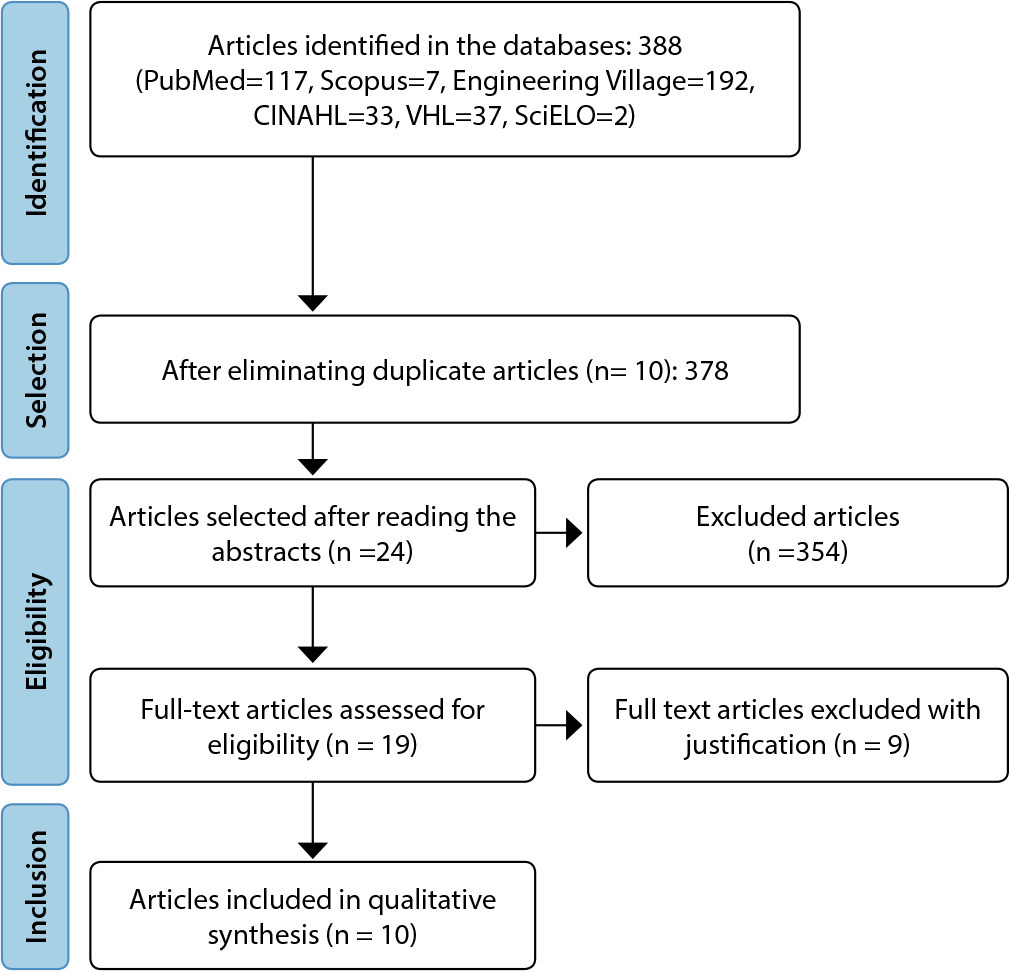
-
REVIEW05-13-2024
Stunting predictors among children aged 0-24 months in Southeast Asia: a scoping review
Revista Brasileira de Enfermagem. 2024;77(2):e20220625
Abstract
REVIEWStunting predictors among children aged 0-24 months in Southeast Asia: a scoping review
Revista Brasileira de Enfermagem. 2024;77(2):e20220625
DOI 10.1590/0034-7167-2022-0625
Views0See moreABSTRACT
Objective:
To identify predictors of stunting among children 0-24 months in Southeast Asia.
Methods:
This scoping review focused on articles with observational study design in English published from 2012 to 2023 from five international databases. The primary keyword used were: “stunting” OR “growth disorder” AND “newborn” AND “predict” AND “Southeast Asia”.
Results:
Of the 27 articles selected for the final analysis there are thirteen predictors of stunting in seven Southeast Asia countries. The thirteen predictors include the child, mother, home, inadequate complementary feeding, inadequate breastfeeding, inadequate care, poor quality foods, food and water safety, infection, political economy, health and healthcare, water, sanitation, and environment, and social culture factor.
Conclusion:
All these predictors can lead to stunting in Southeast Asia. To prevent it, health service providers and other related sectors need to carry out health promotion and health prevention according to the predictors found.
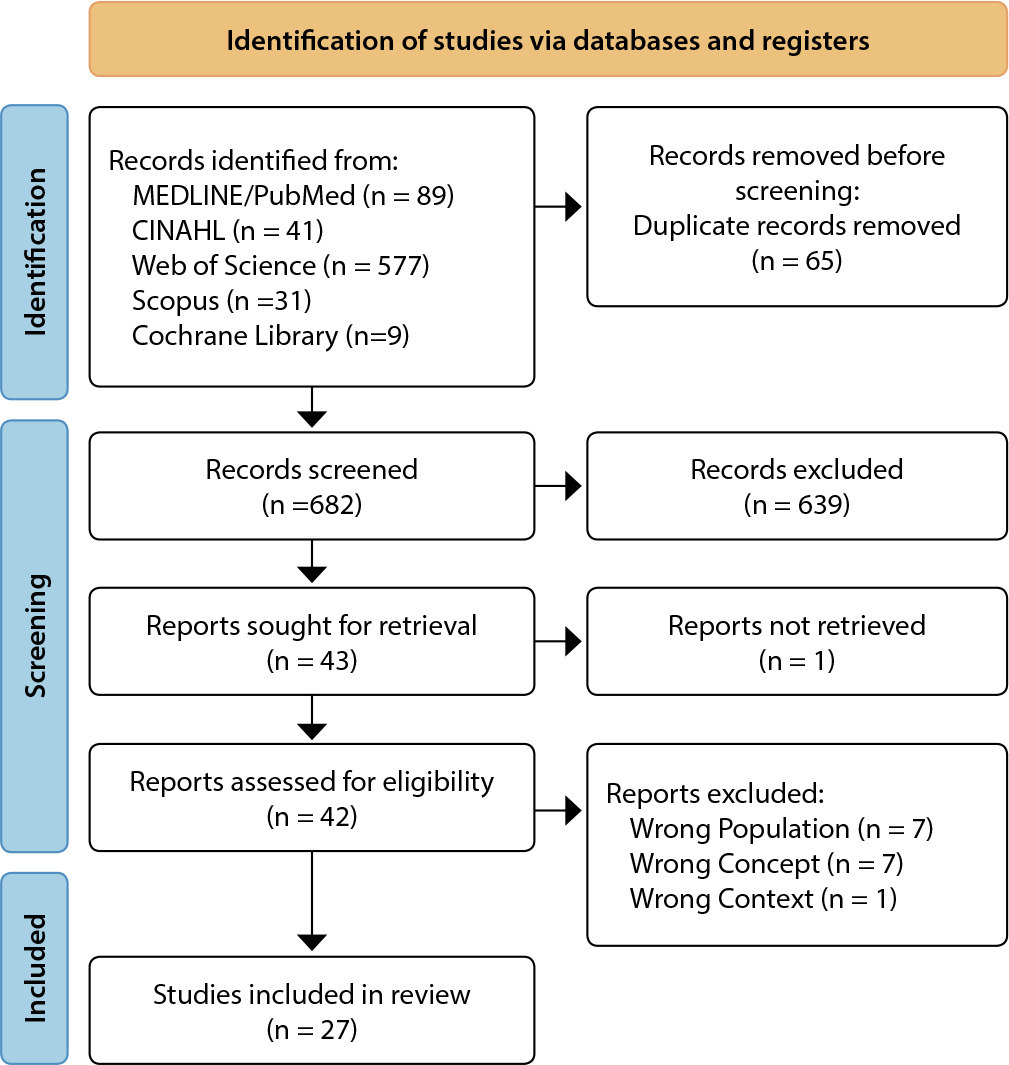
-
05-13-2024
A influência da internet nas escolhas sobre a saúde e o bem-estar dos idosos
Revista Brasileira de Enfermagem. 2024;77(1):e20230321
Abstract
A influência da internet nas escolhas sobre a saúde e o bem-estar dos idosos
Revista Brasileira de Enfermagem. 2024;77(1):e20230321
DOI 10.1590/0034-7167-2023-0321
Views0See moreRESUMEN
Objetivos:
describir el perfil de los ancianos que acceden a internet para buscar información de salud e identificar los factores que pueden influir en las decisiones de los ancianos sobre su salud a partir de la información recopilada en línea.
Métodos:
391 ancianos respondieron a un cuestionario online sobre hábitos y satisfacción con la información de salud recogida en internet. El procesamiento de datos implicó regresión logística.
Resultados:
la educación superior reduce en un 44% la probabilidad de que un anciano siga las recomendaciones de salud en los sitios web. Sin embargo, las actividades sociales y la salud autopercibida aumentan la posibilidad de seguir las recomendaciones en un 83% y un 71%, respectivamente. La creencia de que internet promueve hábitos saludables aumenta 29,2 veces la probabilidad de que un anciano siga un consejo.
Consideraciones Finales:
conocer el perfil de los ancianos que utilizan internet puede ayudar a los profesionales a formular políticas públicas y construir buenas plataformas de información sobre salud y bienestar.
-
ORIGINAL ARTICLE05-13-2024
The influence of the internet on choices about older adults’ health and well-being
Revista Brasileira de Enfermagem. 2024;77(1):e20230321
Abstract
ORIGINAL ARTICLEThe influence of the internet on choices about older adults’ health and well-being
Revista Brasileira de Enfermagem. 2024;77(1):e20230321
DOI 10.1590/0034-7167-2023-0321
Views0See moreABSTRACT
Objectives:
to describe the profile of older adults who access the internet to search for health information and identify the factors that can influence older adults’ decisions about their health based on information collected online.
Methods:
391 older adults answered an online questionnaire regarding habits and satisfaction with information about health collected on the internet. Data processing involved Logistic Regression.
Results:
higher education reduces by 44% the likelihood of an older adult following the health recommendations on internet sites. However, social activities and self-perceived health increase the possibility of following the recommendations by 83% and 71%, respectively. The belief that the internet promotes healthy habits increases by 29.2 times the probability of an older adult following the advice.
Final Considerations:
knowing the profile of older adults who use the Internet can help professionals formulate public policies and build good information platforms on health and well-being.
-
REVIEW05-13-2024
Technologies used in the treatment of burn victims in intensive care: a scope review
Revista Brasileira de Enfermagem. 2024;77(1):e20220738
Abstract
REVIEWTechnologies used in the treatment of burn victims in intensive care: a scope review
Revista Brasileira de Enfermagem. 2024;77(1):e20220738
DOI 10.1590/0034-7167-2022-0738
Views0See moreABSTRACT
Objectives:
to analyze the technologies used by the nursing team in the treatment of skin lesions caused by burns in patients under intensive care.
Methods:
this is a scope review conducted on the LILACS, Medline, PubMed, and CINAHL databases without temporal or language restrictions.
Results:
the highlighted technologies included the use of specialized dressings, biological agents such as probiotics and cyanobacteria, as well as negative pressure therapies and enzymes such as papain and collagenase. Some technologies, such as nanocrystalline silver, demonstrated efficacy in infection control.
Final Considerations:
the study identified essential technologies in burn care, emphasizing the need for further research on “soft” technologies. The findings support the promotion of evidence-based nursing care for burn patients in intensive care and enhance knowledge about effective treatments.
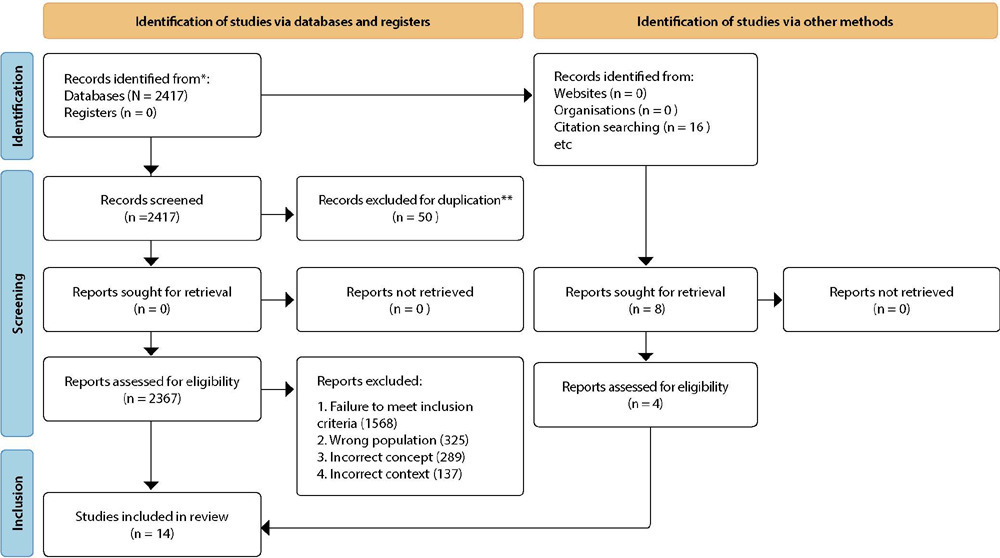
-
ORIGINAL ARTICLE05-03-2024
What is the burden of multimorbidity and the factors associated with its occurrence in elderly Brazilians?
Revista Brasileira de Enfermagem. 2024;77(1):e20220809
Abstract
ORIGINAL ARTICLEWhat is the burden of multimorbidity and the factors associated with its occurrence in elderly Brazilians?
Revista Brasileira de Enfermagem. 2024;77(1):e20220809
DOI 10.1590/0034-7167-2022-0809
Views0See moreABSTRACT
Objective:
To estimate the prevalence of multimorbidity in elderly people and its association with sociodemographic characteristics, lifestyle, and anthropometry.
Methods:
This was a cross-sectional study using data from the National Health Survey, 2019. A total of 22,728 elderly individuals from all 27 Brazilian states were randomly selected. Poisson regression models with robust variance were employed, and a significance level of 5% was adopted.
Results:
The prevalence of multimorbidity was 51.6% (95% CI: 50.4-52.7), with the highest estimates observed in the South and Southeast. Multimorbidity was associated with being female (aPR = 1.33; 95% CI: 1.27-1.39), being 80 years old or older (aPR = 1.12; 95% CI: 1.05-1.19), having low education (aPR = 1.16; 95% CI: 1.07-1.25), past cigarette use (aPR = 1.16; 95% CI: 1.11-1.21), insufficient physical activity (aPR = 1.13; 95% CI: 1.06-1.21), and screen use for 3 hours or more per day (aPR = 1.13; 95% CI: 1.08-1.18).
Conclusion:
Multimorbidity affects more than half of the elderly population in Brazil and is associated with social, demographic, and behavioral factors.

-
ORIGINAL ARTICLE05-03-2024
Cancer patient satisfaction regarding the quality of information received: psychometric validity of EORTC QLQ-INFO25
Revista Brasileira de Enfermagem. 2024;77(1):e20230358
Abstract
ORIGINAL ARTICLECancer patient satisfaction regarding the quality of information received: psychometric validity of EORTC QLQ-INFO25
Revista Brasileira de Enfermagem. 2024;77(1):e20230358
DOI 10.1590/0034-7167-2023-0358
Views0See moreABSTRACT
Objectives:
to psychometrically validate the European Organization for Research and Treatment of Cancer Core Quality of Life Questionnaire EORTC QLQ-INFO25 instrument and identify the domains that influence patients’ perception of the information received.
Methods:
a cross-sectional methodology with cancer patients in a Brazilian philanthropic hospital institution. Sociodemographic and clinical instruments, EORTC QLQ-C30, EORTC QLQ-INFO25 and Supportive Care Needs Survey – Short Form 34 were used. Analysis occurred using Cronbach’s alpha coefficients, intraclass correlation, test-retest and exploratory factor analysis.
Results:
128 respondents participated. Cronbach’s alpha coefficient was 0.85. The test-retest obtained p-value=0.21. In the factor analysis, one item was excluded. Satisfaction with the information received was 74%, with three areas with averages below 70%. In open-ended questions, there was a greater desire for information.
Conclusions:
validity evidence was obtained with instrument reliability, consistency and stability. Respondents expressed satisfaction with the information received.
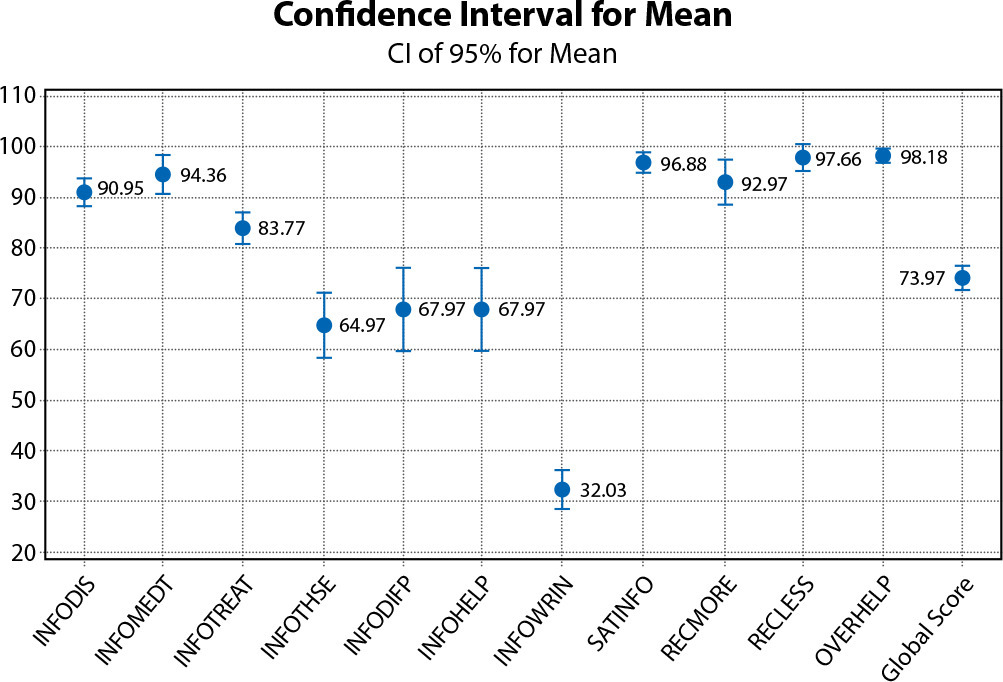
-
ORIGINAL ARTICLE09-23-2022
Brain death communication with parents of children and adolescents: care strategies
Revista Brasileira de Enfermagem. 2022;75(3):e20210943
Abstract
ORIGINAL ARTICLEBrain death communication with parents of children and adolescents: care strategies
Revista Brasileira de Enfermagem. 2022;75(3):e20210943
DOI 10.1590/0034-7167-2021-0943
Views0See moreABSTRACT
Objectives:
to identify care strategies developed by professionals from critically ill patients’ units in communicating BD with parents of children and adolescents.
Methods:
an exploratory and descriptive research with a qualitative approach, carried out in two health institutions between October and December 2019, through semi-structured interviews. Data analysis took place through content analysis.
Results:
twenty-one professionals participated. Three care strategies were identified: actual clinical situation in suspected brain death; sensitizing families to the real clinical situation after brain death diagnosis; and time to assimilate the death information.
Final Considerations:
the care strategies for communicating brain death to families identified in this study present the possibility of subsidizing health managers in training and support promotion for professionals in care practice. Moreover, they can be incorporated and validated in the care practice of the studied context.
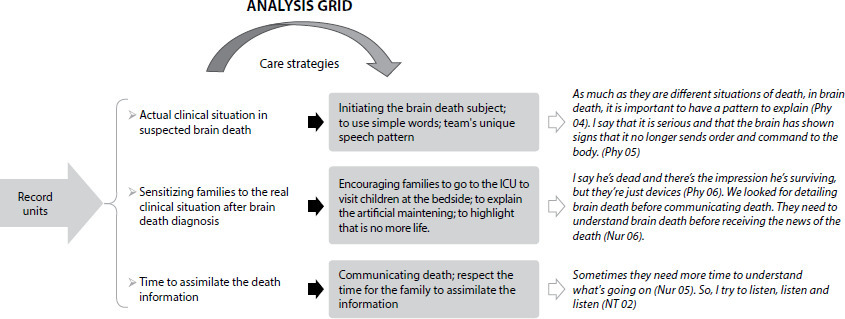
-
ORIGINAL ARTICLE03-30-2022
Nursing diagnoses of newborns in rooming-in care using ICNP®
Revista Brasileira de Enfermagem. 2022;75(4):e20200672
Abstract
ORIGINAL ARTICLENursing diagnoses of newborns in rooming-in care using ICNP®
Revista Brasileira de Enfermagem. 2022;75(4):e20200672
DOI 10.1590/0034-7167-2020-0672
Views1See moreABSTRACT
Objectives:
to create nursing diagnosis definitions for newborns in rooming-in care, using the International Classification for Nursing Practice (ICNP).
Methods:
methodological study following the steps for the identification and validation of relevant terms to care for clients; cross-mapping of the terms identified with the terms of the ICNP® 2019; elaboration and validation of the nursing diagnostic definitions of ICNP® and later classification according with the Basic Human Needs described by Wanda Horta.
Results:
from the terms extracted, 168 were validated through specialist consensus, subsidizing the elaboration of 27 diagnosis definitions.
Conclusions:
the most common diagnoses for the clients studied were: “Effective Feeding Behaviour”, “Effective Urination”, “Normal Respiration Rhythm”, “Effective Swallowing”, “Effective Peripheral Intravenous Access”, and “Effective Parent Child Attachment”. It was confirmed that the records of psychobiological needs are mainly made by nurses, which were responsible for 23 of the diagnoses in this study.
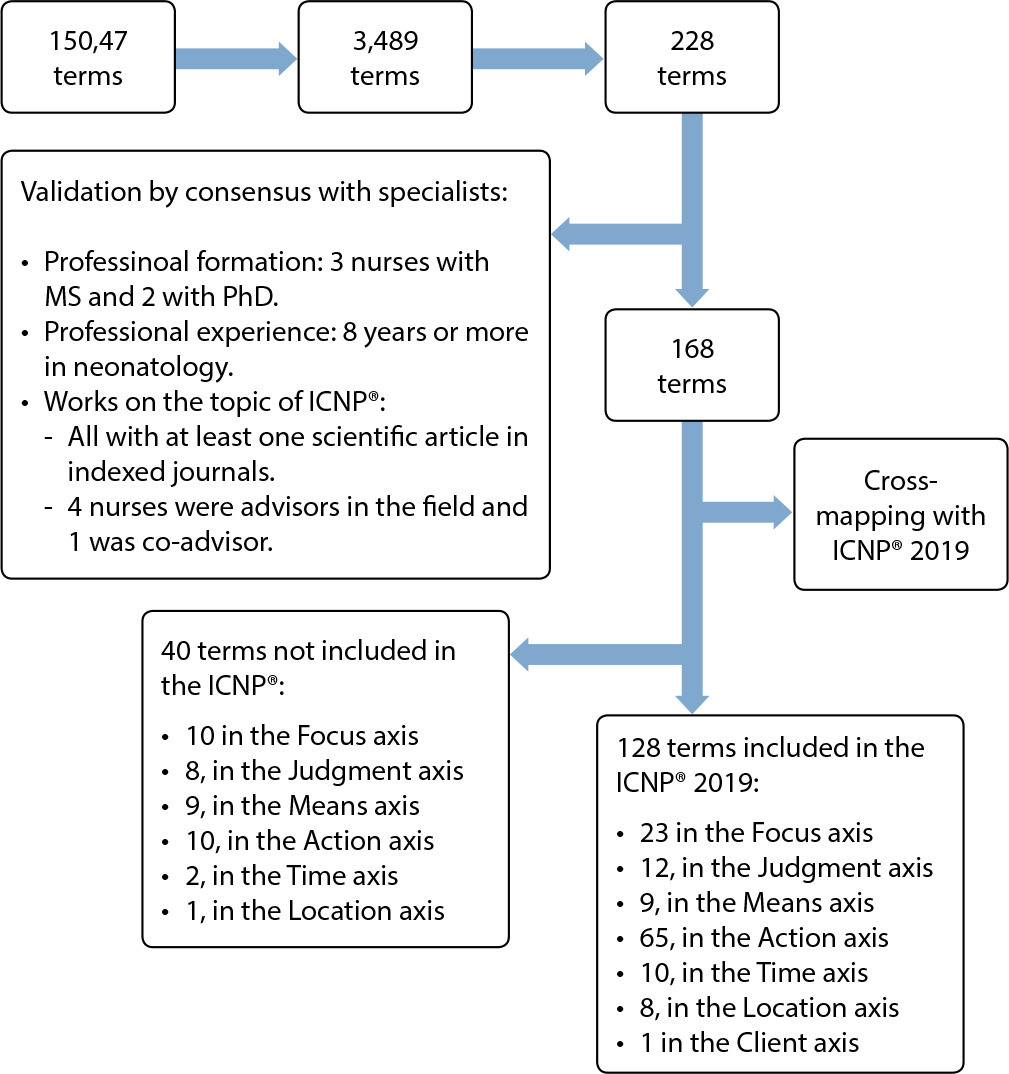
-
ORIGINAL ARTICLE10-07-2022
Nursing workload associated with neonatal mortality risk: a cross-sectional study
Revista Brasileira de Enfermagem. 2022;75(4):e20200965
Abstract
ORIGINAL ARTICLENursing workload associated with neonatal mortality risk: a cross-sectional study
Revista Brasileira de Enfermagem. 2022;75(4):e20200965
DOI 10.1590/0034-7167-2020-0965
Views0See moreABSTRACT
Objectives:
to analyze the association between nursing workload and neonatal mortality risk in newborns admitted to the Neonatal Intensive Care Unit.
Methods:
this is an observational, cross-sectional study conducted from January 2019 to January 2020.
Results:
the sample consisted of 399 newborns, 55.4% male, Nursing Activities Score mean of 67.5%, and Score for Neonatal Acute Physiology Perinatal Extension mean of 17.7, revealed itself as a predictor of the risk of death, while gestational age, length of hospitalization, and the first-minute Apgar established a protective relationship. The correlation between workload and neonatal mortality was low (r= 0.23, p=0.0009).
Conclusions:
the workload of the nursing team is not associated with the risk of mortality in the Neonatal Intensive Care Unit, as measured by the Nursing Activities Score.
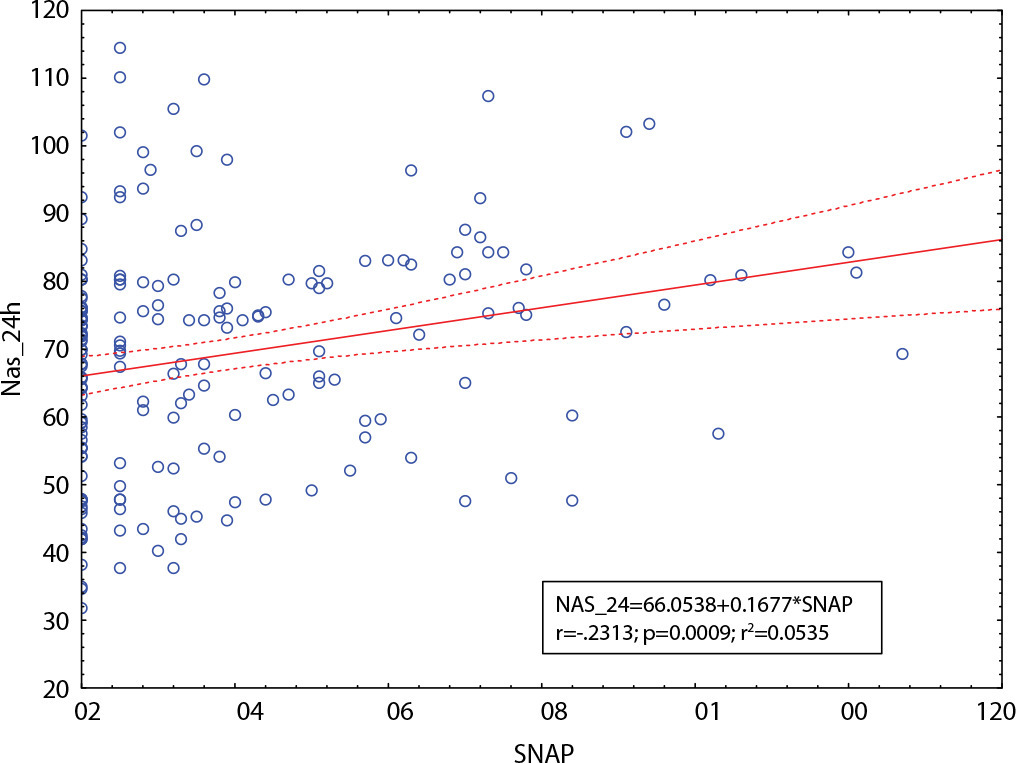
-
ORIGINAL ARTICLE04-15-2022
Risk factors for infiltration in children and adolescents with peripheral intravenous catheters
Revista Brasileira de Enfermagem. 2022;75(4):e20210176
Abstract
ORIGINAL ARTICLERisk factors for infiltration in children and adolescents with peripheral intravenous catheters
Revista Brasileira de Enfermagem. 2022;75(4):e20210176
DOI 10.1590/0034-7167-2021-0176
Views0See moreABSTRACT
Objectives:
to estimate the incidence of infiltration and the factors associated with its occurrence in children and adolescents in the operative period and with peripheral intravenous catheters.
Methods:
a longitudinal and prospective study with children and adolescents using peripheral intravenous catheters, conducted at the surgical clinic unit of a pediatric hospital in Feira de Santana, State of Bahia, from April 2015 to December 2016. The study used Pearson’s chi-square and Fisher’s exact test for the analysis. It also applied multiple analyses using Poisson regression with robust variance.
Results:
the incidence of infiltration was 31.2% and was associated with female sex (RR=0.53; CI=[0.30-0.96]), non-eutrophic children (RR=2.27; CI=[1.25-4.20]), who used non-irritating and non-vesicant drugs (RR=1.72; CI=[1.03-2.87]), vesicant drugs (RR=1.84; CI=[1.05-3.22]) and irritating/vesicant electrolytes (RR=2.35; CI=[1.38-3.97]).
Conclusions:
the study suggests the development of strategies that will help in the prevention of this adverse event through the knowledge of the associated factors.
-
ORIGINAL ARTICLE02-25-2022
Death of children by domestic accidents: unveiling the maternal experience
Revista Brasileira de Enfermagem. 2022;75(4):e20210435
Abstract
ORIGINAL ARTICLEDeath of children by domestic accidents: unveiling the maternal experience
Revista Brasileira de Enfermagem. 2022;75(4):e20210435
DOI 10.1590/0034-7167-2021-0435
Views0See moreABSTRACT
Objectives:
to unveil the meanings of mothers whose children died as a result of domestic accidents in childhood.
Methods:
a qualitative research, in the light of Heideggerian phenomenology, with ten mothers whose children died from domestic accidents. It was carried out in a municipality of the Northeast Region of Brazil through phenomenological interviews between May and June 2017. The existential analytic was constituted by the comprehensive moments of the Heideggerian method.
Results:
the meanings unveiled pointed out that, to understand the sudden death of her child, the mother oscillates between feeling guilty, pointing and denying guilt. She reports emptiness, permanent pain, non-acceptance of her child’s death, and the desire to keep him in her life. In this journey, the fear that brings limitations to her life and that of her other children is revealed. Final Considerations: it was revealed that the death of the child in infancy compromises the integrality of being a mother, indicating the need for systematic and continuous care for the adequate management of the emotional and social effects.
-
ORIGINAL ARTICLE04-15-2022
Meanings attributed to changes occurring after bariatric surgery: an analysis in the light of Grounded Theory
Revista Brasileira de Enfermagem. 2022;75(4):e20210463
Abstract
ORIGINAL ARTICLEMeanings attributed to changes occurring after bariatric surgery: an analysis in the light of Grounded Theory
Revista Brasileira de Enfermagem. 2022;75(4):e20210463
DOI 10.1590/0034-7167-2021-0463
Views0See moreABSTRACT
Objectives:
to understand the meanings attributed to the changes experienced after bariatric surgery by people with obesity.
Methods:
this is a study with a qualitative approach, with a theoretical framework in Symbolic Interactionism; and methodological, in the Grounded Theory. There were 12 participants who underwent bariatric surgery in two health services (bariatric surgery clinic; general hospital). Data collection took place between July and October 2020, through an intensive interview. Testimonies were recorded using an electronic device and transcribed in full. Data were coded in the MAXQDA 2020 software and analyzed considering the adopted theoretical framework.
Results:
two categories emerged: Rebuilding a social life; and Rediscovering self-esteem. From the articulation of these categories, the phenomenon “Re-signifying life after bariatric surgery” was constructed.
Final Considerations:
bariatric surgery contributed to significant changes in the daily lives of participants, and Symbolic Interactionism allowed the understanding of how participants interpreted their meanings.
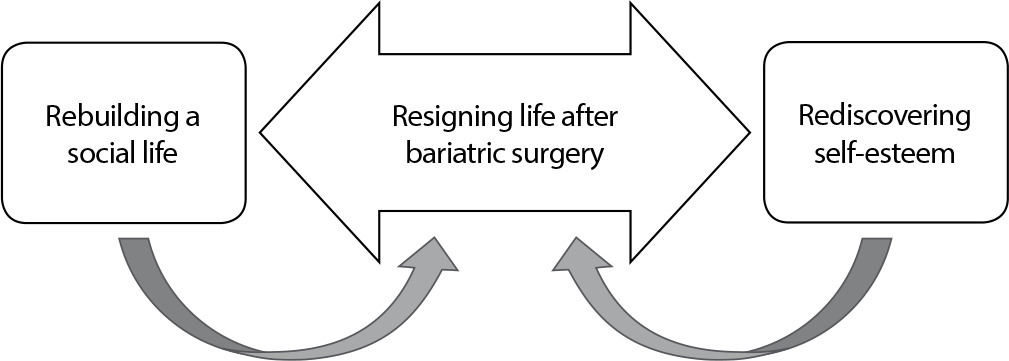
-
ORIGINAL ARTICLE04-15-2022
Correlation between fatigue and quality of life self-reported by adolescents with cerebral palsy
Revista Brasileira de Enfermagem. 2022;75(4):e20210716
Abstract
ORIGINAL ARTICLECorrelation between fatigue and quality of life self-reported by adolescents with cerebral palsy
Revista Brasileira de Enfermagem. 2022;75(4):e20210716
DOI 10.1590/0034-7167-2021-0716
Views0See moreABSTRACT
Objectives:
to investigate the correlation between fatigue and quality of life in adolescents with cerebral palsy who are susceptible to more significant fatigue and lower quality of life.
Methods:
cross-sectional study conducted with 101 adolescents with cerebral palsy. Instruments such as the Pediatric Quality of Life Inventory and Gross Motor Function Classification System were used, and Kolmogorov-Smirnov, Mann-Whitney, and Spearman tests were applied.
Results:
older adolescents self-reported higher fatigue levels, and female adolescents, quadriplegic, with worse motor function, older, and not attending school had lower quality of life scores. Higher fatigue levels correlated with lower quality of life in all domains (p<0.01), especially in tiredness (general and mental) and functioning (social, academic, and psychosocial).
Conclusions:
fatigue correlated negatively with the quality of life of adolescents with cerebral palsy, showing that the higher the level of fatigue, the more compromised is the adolescents’ life.
-
ORIGINAL ARTICLE05-09-2022
Factors associated with the skills of informal caregivers in home care
Revista Brasileira de Enfermagem. 2022;75(4):e20210744
Abstract
ORIGINAL ARTICLEFactors associated with the skills of informal caregivers in home care
Revista Brasileira de Enfermagem. 2022;75(4):e20210744
DOI 10.1590/0034-7167-2021-0744
Views0See moreABSTRACT
Objective:
To identify factors associated with cognitive, emotional, psychomotor, and relational skills of informal caregivers in home care.
Methods:
A cross-sectional study carried out with a sample of 216 informal caregivers residing in a municipality in the state of Paraná. Data collection took place between February and July 2019, with an instrument developed and validated to assess the skills of informal caregivers. Descriptive and inferential analyses were used.
Results:
The factors associated with a greater competence of informal caregivers were being female, having training in the field, and having more than five years home care experience. The lowest competence was observed in caregivers who had health problems and belonged to the lowest strata of family purchasing power. Participants had lower scores in psychomotor competence and had better results in cognitive competence.
Conclusion:
It was found that women with experience in care had higher levels of competence to provide quality care at home assistance services.
Search
Search in:
Nuvem de Tags
Adolescente (85) Atenção Primária à Saúde (239) COVID-19 (91) Criança (91) Cuidados de Enfermagem (269) Educação em Enfermagem (151) Educação em Saúde (139) Enfermagem (930) Enfermagem Pediátrica (86) Estudantes de Enfermagem (77) Estudos de Validação (131) Família (87) Idoso (208) Promoção da Saúde (99) Qualidade de Vida (104) Saúde do Trabalhador (86) Saúde Mental (145) Saúde Pública (82) Segurança do Paciente (150) Tecnologia Educacional (100)



